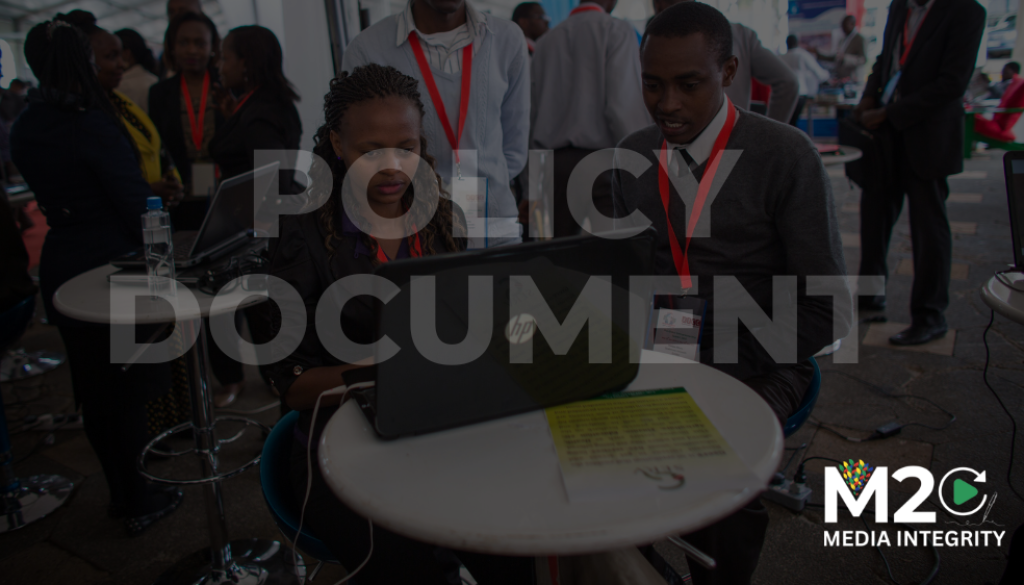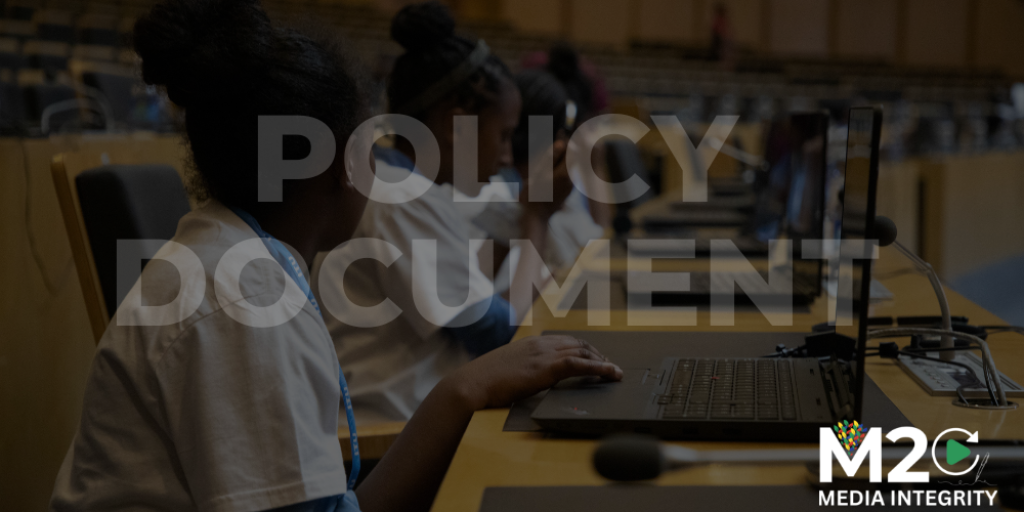M20 Policy Brief 3: Information integrity on climate change must be an integral pillar of the G20 agenda
Download the PDF here.
Lead Writer: Katharina Zuegel, Policy Director at the Forum on Information and Democracy
Overview
The environment, climate sustainability and energy transition are key pillars of the South African presidency of the G20 in 2025 with dedicated Sherpa Tracks. Building on the legacy of the Brazilian presidency of the G20, which recognised Information integrity as a priority, notably in the Digital Ministers’ declaration and through the launch of Brazilian Global Initiative on Information Integrity on Climate Change, this paper argues that there is an opportunity to ensure the priority remains on the G20 agenda.
Only in recognising and tackling the effects of the information space on climate sustainability, environmental protection and energy transition, can the G20 effectively promote and implement dedicated policies. Disinformation, which is coordinated and well-funded, coupled with insufficient access to reliable information, in part due to attacks against environmental journalists, have become key factors hindering effective action on climate change and the environment.
The proposal to the G20
The G20 should recognise that promoting information integrity on climate change and environmental issues must be an integral pillar of the G20. The UN’s Global Principles for Information Integrity define information integrity as a condition “where freedom of expression is fully enjoyed and where accurate, reliable information, free from discrimination and hate, is available to all in an open, inclusive, safe and secure information environment”. Only in addressing these issues can the South African G20 presidency priorities of Solidarity, Equality, Sustainability be achieved. The G20 should, within its Sherpa Track on Environment and Climate Sustainability and within its track on Energy transitions, develop dedicated priorities on information integrity. These need to address the coordinated and well-financed nature of climate and environmental disinformation, the harms of the information ecosystem, the insufficient access to and trust in reliable and scientific information as well as the situation of the news media, which is suffering from attacks against journalists and financial instability.
Defining the critical issue and role of the G20
The G20 gives much attention to climate change and the environment, as reflected by “sustainability” as one of the three key themes of the South African Presidency. More concretely, the G20 Sherpa Track: Environment and Climate Sustainability Working Group objective is to advance the 2030 Agenda for Sustainable Development focusing on:
- Biodiversity and Conservation
- Land Degradation, Desertification and Drought
- Chemicals and Waste Management
- Climate Change and Air Quality
- Oceans and Coasts.
In addition, the Just Energy Transitions Workstream addresses issues such as “energy access and affordability, sustainable finance”.
As explained in the M20 Policy brief on Information Integrity, information integrity was on the agenda in the 2024 G20 and is reflected in several international documents. In particular, the Brazilian government, as part of its G20 presidency, launched a Global Initiative on Information Integrity on Climate Change in Partnership with the UN and UNESCO. The initiative recognises the importance of the global information ecosystem for the fight against climate change. The initiative has been joined by other G20 countries notably France and the UK.
However, the topic of information integrity is not yet recognised within the 2025 priorities. Yet, research shows that climate, environmental action and energy transition are hindered by attacks against information integrity.
Coordinated, financed and targeted climate disinformation:
Climate disinformation is defined as intentionally misleading content that undermines the scientific consensus. It aims to delay policy action and is characterised by a coordinated and well-targeted process. Climate disinformation can undermine consensus on the existence of climate change and the responsibility of mankind as such, or it can be more targeted at specific policy interventions to create doubts about their effectiveness and usefulness. Climate disinformation is well-financed, by vested interests such as, for example, the fossil fuel industry, that directly benefits from delaying climate action. [1]
Disinformation on environmental issues, such as land protection or biodiversity, is less researched but seems to be more localised, aimed at hindering specific policy actions and minimising the environmental impact and harm of specific projects or industries.
Both climate and environmental disinformation create doubts, distrust in science and thereby hinder effective policy actions. According to the IPIE’s Scientific Panel on Information Integrity about Climate Science one of the key actors targeted by climate disinformation are policy makers. Climate disinformation, as a very polarised issue, also serves to exacerbate broader divisions in society. Coordinated, well-financed and targeted climate disinformation does not only hinder the implementation of the specific policy actions proposed within G20 frameworks, but also impacts civic discourse, democratic processes and election outcomes.
It is thus crucial that the issue of fighting climate and environmental disinformation is taken up within the consultation and negotiation process of the G20 and its Sherpa tracks related to the environment, climate and energy. Only through a holistic approach, can the G20 propose urgent and effective measures to promote sustainability.
Attacks against journalists and the crisis of news media
Disinformation has a fertile ground to spread when access to reliable information is insufficient. The news media, as the fourth estate, plays a crucial role in uncovering environmental and climate scandals, in holding politicians to account and in translating complex environmental issues and research for the general public.
Yet, the news media suffers from several crises inhibiting them to effectively play their role. According to Reporters without Borders latest World Press Freedom Index, the economic indicator is at an unprecedented low, with an overall press freedom situation classified as difficult. UN Secretary-General Antonio Guterres has warned of a “media extinction”. With funding cuts and an overall decline in advertising revenue, media outlets are forced to lay off journalists, reduce coverage or close down altogether.
In addition, reporting about climate and environmental crises is hampered by repressive practices and lack of media freedom. According to Reporters without Borders analysis, two-thirds of the world’s natural resource extraction occurs in countries with a difficult or serious press freedom situation. This makes journalistic investigations about fossil fuel industries or mining very difficult. Even in countries with overall better world press freedom scores, environmental journalists are victims of attacks, threats, harassment or killings. RSF has, for example, identified several press freedom violations in the Brazilian Amazon. According to UNESCO statistics, 44 environmental journalists were killed during the last 15 years worldwide.
As argued in the M20 Policy brief on Information Integrity, the G20 should discuss, propose and implement effective policies to promote press freedom and the sustainability of news media. Environmental journalists play a particular role in investigating climate change factors and consequences, holding government and industry accountable for their climate change action and to mobilise public support.
Lack of trust in media and science
Finally, the G20 climate and environment-related tracks should take into account the low levels of trust in media and science, hampering access to reliable information and the creation of an informed citizenry.
According to the Reuters Institute Digital News Report 2025 engagement with traditional media continues to fall while social media, video platforms and online aggregators gain in importance. Only 40% state that they trust the news media whereas 58% indicate that they are concerned about their own ability to identify reliable information and distinguish it from false news.
Linked to the low levels of trust in media, are also insufficient access to reliable scientific information and concerns about trust in science. According to a large-scale survey, trust in science and its methods is moderately high. Despite this, distrusting minorities can influence policy making, particularly if they receive media coverage and are supported by politicians.
G20 priorities should therefore take into account how to provide access to reliable scientific information, encourage trust in this information and strengthen literacy about how to identify fact-based from false information.
Key questions for discussion during consultations
- Assessing the risks: How present and damaging is disinformation on environmental and energy topics? Who are its actors, what are its tactics? What research is needed to better understand the risks?
- Co-regulating and regulating the digital space: Which mechanisms exist to (co)-regulate the digital space, including social media platforms, search engines and generative AI to hamper the spread of disinformation and strengthen access to reliable information? Which data access provisions can support independent research about methods and effects?
- Defending environmental journalists: What effective mechanisms exist to provide safety to environmental journalists? What policies can strengthen overall media freedom and the ability of the media to investigate and report about environmental and climate issues? What policies can create an enabling environment and prepare journalists for this task?
- Promoting sustainability of the news media: Which policies can strengthen business models and access to finance for the news media? Are there specific approaches to strengthen investigative journalism on climate and environmental reporting?
- Strengthening access to and trust in reliable information on environmental and climate issues: What effective policies exist to promote access to environmental and climate information and strengthen trust in it? What is the role of strategic communication? How to strengthen literacy and critical thinking? How to provide access to complicated scientific information to the general public?
Proposed text for inclusion in G20 outputs
For the Heads of State (“Leaders’ declaration”):
“We recognize the importance of access to reliable, independent and pluralistic information sources on climate change and environmental issues and will bolster our efforts to ensure the safety of environmental journalists, access to scientific and fact-based information online and to address the root causes of climate disinformation and climate change denialism.”
Climate and Environmental Sustainability Working Group Ministerial Meeting Declaration
“Information integrity is essential to promote climate and environmental sustainability. By ensuring access to reliable information, it enables citizens to build an informed opinion and drives policy change. In times of coordinated and well-financed climate disinformation and attacks against environmental journalists there is a need to promote a global information space based on transparency, accountability, pluralism and access to reliable information. There is also a need to support the sustainability of the news media and put in place safety measures for environmental journalists.”
Energy Transitions Working Group Ministerial Meeting Declaration
“Investigative reporting and access to reliable information on energy issues is the backbone for effective and well-targeted policies to ensure an inclusive and sustainable energy transition. There is a need for an enabling environment for journalists to conduct their work and citizens to access fact-based information.”
Recommendations and opportunities for G20 media
- News media plays an essential role in reporting about climate and environmental issues and providing access to reliable information. Media could also play an active role in investigating how narratives and disinformation are employed to counter G20 negotiations on climate, environmental and energy issues.
- News media is encouraged to collaborate with relevant stakeholders such as civil society organisations and scientists to provide access to reliable information. They are also encouraged to develop self-regulatory practices to counter disinformation within its sector.
Acknowledgements and call for comments
This policy brief has been drafted for the M20 initiative by the Forum on Information and Democracy in the framework of its workstream on information integrity, climate change and other environmental issues co-chaired by the governments of Armenia and Brazil. This workstream is part of the Partnership for Information and Democracy, an intergovernmental non-binding agreement signed by 55 countries worldwide, including South Africa.
This policy brief was commissioned within the framework of the M20 ahead of the G20 Summit.
The M20 initiative is a “shadow” parallel process set up to intersect with the G20 processes. The M20 seeks to persuade the G20 network of the most powerful global economies to recognise the news media’s relevance to their concerns.
As a collaborative M20 document, this paper is a working, live document. Share your suggestions or comments for consideration: [email protected].
For more information about the G20 process, which is hosted by South Africa in 2025, visit the website here
This policy brief can be republished under Creative Commons licence, – i.e. provided that you credit the source, indicate any changes to the text, and link back to the original article on the M20 site.
[1] Angela V. Carter, Fossilized: Environmental Policy in Canada’s Petro-Provinces (UBC Press, 2020).
- Share your suggestions or comments for consideration: [email protected].



